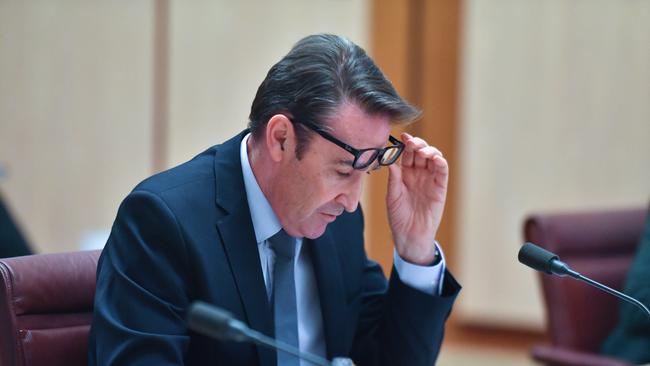JobKeeper coronavirus stimulus effects will be long-lasting: Treasury
Treasury has pushed back against the idea of the economy ‘falling off a cliff’ when the JobKeeper support package ends in September.

Treasury secretary Steven Kennedy says the economy will not fall off a “cliff” on September 30 when tens of billions of dollars in COVID-19 support packages are due to end.
Appearing at a Senate committee hearing into the government’s response to the pandemic, Dr Kennedy said the cut-offs for JobKeeper and expanded JobSeeker support would not be “quite the cliff they look like”.
“The programs stop, but their effects don’t stop,” he said, adding that like monetary policy, fiscal support “works with a lag” and the economic impact “actually builds for four to six quarters”.
Treasury’s review of the Morrison government’s $130bn wage subsidy scheme will be presented as part of Josh Frydenberg’s economic update next month.
There have been growing warnings from industry groups and economists that a sudden withdrawal of emergency support will derail the hoped for post-COVID recovery.
The Treasury boss said he would be “very surprised” if the end of the boosted income and wage support programs “made our quarterly [economic] profile go up and down”.
Dr Kennedy said the support measures, which have also included one-off payments to affected businesses and individuals, are effectively a transfer from the government’s balance sheet to those of households and businesses, which would stagger the spending of the cash as needed.
“I’m not dismissing the impact of getting a very significant amount of money, but it doesn't necessarily turn up in a big growth rate and a big fall” when removed, he said.
Dr Kennedy said whether people had the confidence to spend that money in the recovery phase loomed as a key factor in how much stimulus continued to flow through in the coming months.
Grattan Institute reform program director Danielle Wood said the nature of the emergency support was to plug holes in companies’ cash flows and to cushion the worst of the income shock to individuals who lost their jobs. Ms Wood said the support payments “are not being saved and I suspect most of this would be hitting the economy pretty quickly”.
Dr Kennedy said official labour force data last week that showed a 600,000 plunge in the number of employed Australians in April likely represented the worst of the COVID hit to jobs.
The unemployment rate will move higher from 6.2 per cent in coming months, however, and closer to Treasury’s estimate of 10 per cent as the 500,000 laid-off workers officially return to the workforce and boost the official count of the unemployed.
The Senate committee also heard that more than 900,000 businesses had enrolled for JobKeeper, potentially covering more than six million employees, with $8.1bn paid. The ATO has approved 1.65 million requests for early access to super, amounting to $13.2bn. There has been $5.3bn to 7.1 million people via the first of the $750 welfare payments.
Dr Kennedy said the global outlook was “significantly gloomier than the one outlined by the IMF” earlier this year, which predicted a 3 per cent drop in 2020.
The American and European economies would fall in the “7 per cents” this year, he said.








To join the conversation, please log in. Don't have an account? Register
Join the conversation, you are commenting as Logout